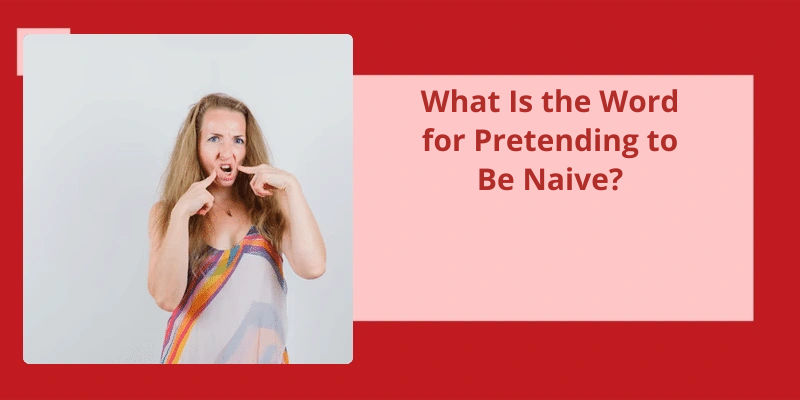The ability to deceive through playful innocence can be a powerful tool in both our personal and professional lives. This skill goes beyond mere acting or performance, as it requires a subtle balance of perceived naivety and deliberate manipulation of the situation. However, what’s the word for this trait? The answer lies in the French terminology of faux-naïf, which denotes the pretense of innocence and lack of knowledge as a means of gaining an advantage. From art to politics, faux-naïf has been a tactic employed by many individuals and can serve as a valuable lesson in social dynamics and communication strategies.
What Is It Called When Someone Pretends to Be Oblivious?
When someone pretends to be oblivious, they’re acting disingenuous. This behavior is characterized by a lack of honesty or sincerity. In many cases, people will feign ignorance in order to avoid taking responsibility for their actions or to garner sympathy from others. This type of behavior can be frustrating for those around them, as it can feel manipulative and insincere.
There are many reasons why someone might choose to be disingenuous in this way. For example, they may be afraid of the consequences of admitting the truth, or they may have a desire to appear more innocent or naive than they actually are. In some cases, this behavior may be a symptom of deeper emotional issues, such as a fear of confrontation or a lack of self-confidence.
Regardless of the reasons behind the behavior, it’s important to recognize the signs of disingenuousness in order to protect oneself from potential manipulation. Some common red flags include evasive answers to direct questions, excessive apologies or excuses, and a tendency to deflect blame onto others. It’s also important to establish clear boundaries and consequences for behavior that feels dishonest or manipulative, in order to discourage disingenuous behavior in the future.
Ultimately, being disingenuous can have serious consequences for both the individual and those around them. It can erode trust and transparency in relationships, making it difficult to build meaningful connections with others. It can also lead to a cycle of dishonesty and manipulation that can be difficult to break free from. By recognizing the signs of disingenuous behavior and setting clear boundaries, individuals can avoid falling into these destructive patterns and live more honest, authentic lives.
Feigning ignorance is a common behavior that many people display for various reasons. It can be a way to avoid responsibility, control a situation, or gain an advantage. However, it can have negative consequences, as it can erode trust and lead to miscommunication. In this article, we’ll explore the reasons behind why people feign ignorance and the impact it can have on relationships and communication.
Why Do People Feign Ignorance?
People may feign ignorance in order to avoid taking responsibility for a certain situation or action. By pretending not to understand a problem or issue, an individual can deflect blame and avoid repercussions. This can be especially effective in situations where the consequence is negative or undesirable.
By pretending not to understand what’s being said or asked of them, an individual can avoid having to engage in a difficult or uncomfortable conversation. This can also be an effective way to avoid taking sides or making a decision, which may be seen as controversial.
Feigning ignorance may also be a way to gain an advantage in a competitive situation. By pretending not to understand a concept or idea, an individual may be able to glean information or insights from others without revealing their own knowledge or intentions. This can be especially useful in business, politics, or other competitive arenas where knowledge is power.
By pretending not to understand something, an individual can lull others into a false sense of security or trust. This can be especially effective in situations where the person feigning ignorance has nefarious intentions, such as scamming or defrauding others.
The Psychological Effects of Feigning Ignorance on the Individual and Those Around Them
Feigning ignorance can affect the mental state of both the individual and others involved. It can cause stress, anxiety, and uncertainty, as well as potentially damaging relationships and creating a lack of trust.
It’s never polite to label someone with an offensive term, but unfortunately, calling someone an idiot is still a common insult used by many people. Used to describe someone who behaves in an extremely stupid manner, the word ‘idiot’ has been around for centuries, and it’s use continues to this day. However, it’s essential to understand that name-calling and labeling someone can be hurtful and disrespectful. So, it’s always better to avoid using derogatory terms to describe someone’s behavior.
What Do You Call a Person Who Acts Dumb?
Using derogatory terms to describe someones behavior is often not the best course of action. Calling someone an idiot who acts dumb isn’t only unkind, but it’s also inaccurate to assume that a persons actions are a reflection of their intelligence. Everyone makes mistakes or may behave in a way that seems foolish from time to time. It’s important to distinguish between a persons actions and their overall intelligence.
In some cases, people may act foolishly or pretend to not know something for attention or to fit in with others. Instead of insulting them, offering guidance or support could help them build confidence and make better choices moving forward.
It’s also important to consider the context in which someone may be presenting as “dumb,” as they may be struggling with a learning disability or processing issue. People with dyslexia, for instance, may experience difficulty with reading or writing that could be mistaken for a lack of intelligence. In these cases, it’s vital to approach the situation with awareness and empathy, and to provide the necessary accommodations or resources.
Labelling someone as an idiot who acts dumb isn’t only hurtful but it also creates a negative and unproductive attitude towards learning. It suggests that it’s acceptable to ridicule and belittle someone for not knowing everything, rather than recognizing that everyone has strengths and weaknesses and that it’s okay not to know everything. It can also instil fear in those who might be too afraid to ask questions or seek help for fear of being mocked.
Instead, we should offer support, empathy, and guidance to help them develop their intelligence and make positive choices. We should also be mindful of how we talk about intelligence and constantly strive to create an atmosphere of support and respect, especially for those struggling with learning disabilities.
The use of Socratic irony can be an effective way to highlight flaws in another person’s thinking or arguments. By adopting an air of ignorance or naivety, the speaker can draw out contradictions or gaps in the other person’s logic, helping to expose the weaknesses behind their claims. However, the technique must be used with care, as it can sometimes come across as insincere or disingenuous if not executed well. In the following sections, we will discuss some of the key features and examples of Socratic irony, as well as it’s potential limitations and drawbacks.
What Is It Called When Someone Pretends to Be Ignorant?
This technique is named after Socrates, a philosopher from ancient Greece who was known for his skillful use of it. Socratic irony is often used in conversations or debates to help someone question their own beliefs or ideas. By playing the fool, the person using Socratic irony can easily guide the conversation in a certain direction without appearing confrontational.
By pretending to be ignorant, the person can ask seemingly innocent questions that are designed to uncover faulty assumptions or flawed reasoning. By doing so, they can help the other person recognize their own gaps in knowledge or inconsistencies in their beliefs.
In some cases, Socratic irony can also be used for more nefarious purposes. Some people use it as a way to manipulate or deceive others by pretending to be less knowledgeable or capable than they actually are. This can be particularly effective in situations where the other person is perceived as being in a position of authority or expertise.
Despite the potential for abuse, Socratic irony remains a powerful tool for critical thinking and self-discovery. By exposing our own ignorance and asking questions to challenge our assumptions, we can expand our understanding of the world and become more open-minded and compassionate individuals.
Examples of Famous Historical Figures Who Have Used Socratic Irony
Socratic irony is a rhetorical technique used to expose discrepancies in someone’s arguments or ideas by making it seem like you agree with them. There are many examples of famous historical figures who’ve employed this technique, including Socrates himself, Plato, Aristotle, and even Jesus Christ.
Conclusion
Overall, the concept of pretending to be naive isn’t a new one, but it’s been given a unique and recognizable label through the borrowing of the French term faux-naïf. This term accurately describes the act of feigning innocence or unknowingness in order to gain an advantage or deceive others. The use of this word, whether as an adjective or noun, adds a level of sophistication and precision to discussions of this type of behavior. It’s a reminder that language evolves and adapts in response to changing cultural contexts and the need for new vocabulary to describe those contexts.






